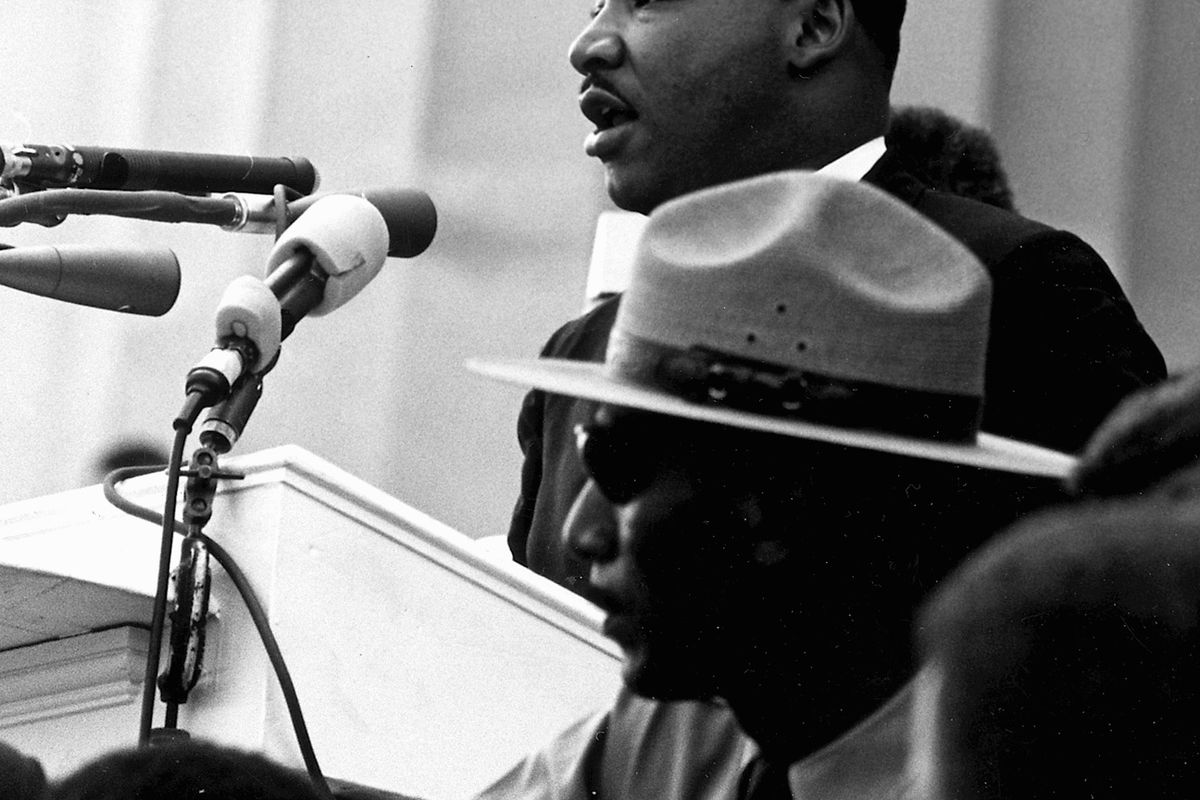Martin Luther King, Jr.'s Internationalism: MLK On Ghana, South Africa, Vietnam & Global Revolution
From African anti-colonial movements to the fight against Apartheid, MLK's thoughts on these struggles were a long way from the American mainstream

It's become a common complaint, that the corporatized version of Dr. King—of Google doodles and Coke ads—the man dreaming of racial harmony and nonviolence, largely misses the point of his life's work. King defanged. For MLK Day 2016, we wanted to go beyond the caricature to find the man beneath.
Some of Dr. King's most memorable sermons and writings are where he deftly connects the struggle for freedom at home with struggles for freedom abroad. From African anti-colonial movements to the War in Vietnam and the fight against South African Apartheid, King's thoughts on these struggles were, and continue to be, a long way from the American mainstream.
Even a quick look through King's archives brings to life a thinker whose wealth of historical knowledge, his Christian faith and the African American experience merge into a radical worldview that feels as relevant today as it did in the 1960s. We've put together some of our favorite internationalist moments and quotes from King's archives.
King in Ghana
King's account of the Ghanaian independence ceremonies notes the humble prison uniforms which the father of Ghanaian nationhood and his ministers wore while administering the independence ceremony. Nkrumah's prison cap and coat, for King, is a reminder and symbol not just of Nkrumah's struggle for Ghanaian independence but of the need for struggle everywhere. In a 1957 sermon to his congregation at Dexter Avenue Baptist Church King relates the meaning of this symbolism back to the fight for civil rights in America:
Ghana has something to say to us. It says to us first, that the oppressor never voluntarily gives freedom to the oppressed. You have to work for it. And if Nkrumah and the people of the Gold Coast had not stood up persistently, revolting against the system, it would still be a colony of the British Empire. Freedom is never given to anybody. For the oppressor has you in domination because he plans to keep you there, and he never voluntarily gives it up. And that is where the strong resistance comes. Privileged classes never give up their privileges without strong resistance.
Source: The King Center
Against South African Apartheid
King was also a vociferous opponent of South African apartheid which he called “a medieval form of segregation organized with 20th century efficiency and drive." At an address to Hunter College in 1965, Dr. King called for an end to economic relations the White supremacist regime.
Africa has been depicted for more than a century as the home of black cannibals and ignorant primitives. Despite volumes of facts contravening this picture the stereotype persists in books, motion pictures, and other media communication. Africa does have spectacular savages and brutes to-day, but they are not black. They are the sophisticated white rulers of South Africa who profess to be cultured, religious and civilized but whose conduct and philosophy stamp them unmistakably as modern day barbarians.
Source: The King Center
Vietnam as Neo-Colonial Adventuring
King saw the Vietnam War as a colonial project and a violation of human rights. From an address to the Nation Institute in Los Angeles, California February 25, 1967:
The second casualty of the war in Vietnam is the principle of self-determination. By entering a war that is little more than a domestic civil war, America has ended up supporting a new form of colonialism covered up by certain niceties of complexity. Whether we realise it or not our participation in the war in Vietnam is an ominous expression of our lack of sympathy for the oppressed, our paranoid anti-communism, our failure to feel the ache and anguish of the have-nots. It reveals our willingness to continue participating in neo-colonialist adventures.
Source: The King Center
Social Justice at Home as Part of a Human-Centered Global Revolution
From "Beyond Vietnam," an address, given at New York City's Riverside Church on April 4, 1967,
I am convinced that if we are to get on the right side of the world revolution, we as a nation must undergo a radical revolution of values. We must rapidly begin the shift from a thing-oriented society to a person-oriented society. When machines and computers, profit motives and property rights are considered more important than people, the giant triplets of racism, extreme materialism and militarism are incapable of being conquered.
Source: The King Center
- 6 Books That Shaped Post-Apartheid South Africa - OkayAfrica ›
- 12 Essential Anti-Apartheid Struggle Songs from South Africa and ... ›
- Boris Johnson is Bad News For Africa: Here's Why - OkayAfrica ›
- Colonialism Was a Disaster and the Facts Prove It - OkayAfrica ›
- Martin Luther King Jr. On South Africa - OkayAfrica ›
- Ghanaian President Nana Akufo-Addo Enters Second Term Amidst Parliamentary Opposition ›
- FOKN Bois & New 'Contradict' Documentary Highlight Despair and Hope in Ghana - OkayAfrica ›
- NYC: MoMA Nights with Masauko Chipembere - Okayplayer ›

